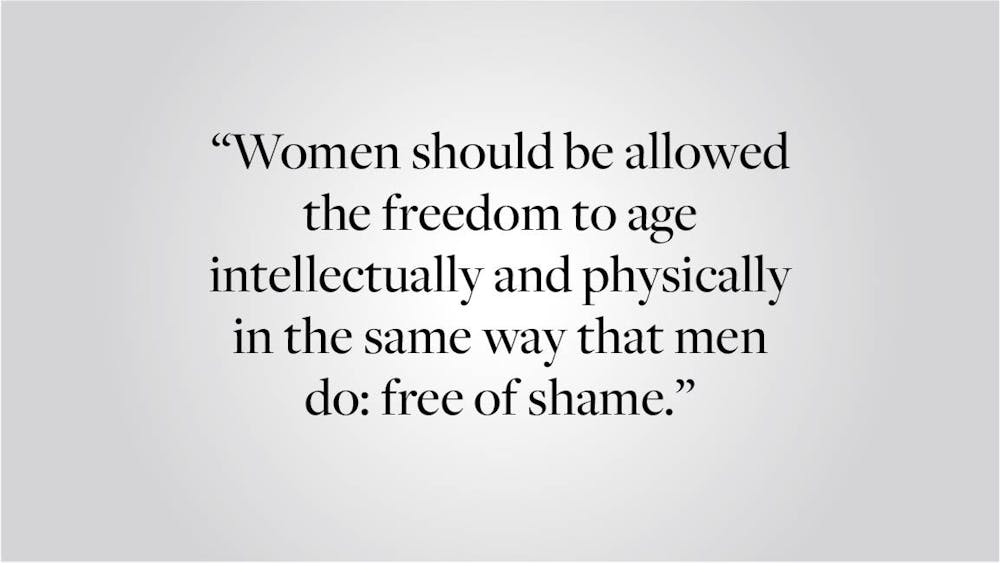When Taylor Swift’s new album “Midnights” came out over a week ago, some were up in arms about one line in the song “Anti-Hero”: “Sometimes, I feel like everybody is a sexy baby and I’m a monster on the hill.” The phrase “sexy baby” confused and even disturbed some, but I was eager to defend the lyric as a description of Swift’s fears of aging. That topic seemed particularly salient to me in light of Jamie Lee Curtis’s quest to make sure that the term “anti-aging” is “struck.” For my part, even at the young age of 22, I’ve been offered advice from my peers and elders on how to avoid visibly aging, from skincare to hair dye. This unsolicited advice has always made me uncomfortable, as I never understood why everyone around me thought I should be afraid to age naturally. After all, why should I be “anti” aging? The social desirability for women to stay young promotes unnecessary hostility towards natural aging and perpetuates the infantilization of women.
The practice of infantilizing women and assigning preference to younger women is fairly easy to illuminate. The “sexy baby” lyric is a prime example of this, as it adopts language from the TV show “30 Rock” in the episode “TGS Hates Women.” In the episode, Tina Fey’s Liz Lemon hires a female writer who she deems a “sexy baby” because the writer assumes an infantilized persona in order to gain attention from men. That character’s successful approach is fairly well-founded on current social norms. Men increasingly prefer younger women as they age. Therefore, when a woman looks or acts younger, men might find her more desirable. In that way, “anti-aging,” as both a commercial advertising mechanism and a social mindset, can be seen as an attempt to keep women’s appearances and mannerisms younger, and consequently more desirable to men.
Although ageism affects everyone, women are especially targeted and stigmatized. A National Institutes of Health study found “injustices” and “inequities” experienced by women when it comes to aging. The researchers found that women experienced societal pressures to dress and look “youthful, thin, unwrinkled and non-grey-haired” and felt that they lost respect as they grew older in comparison to their male counterparts. Of course, this is something of an open secret in our society. We need look no further than the double standard of the “silver fox,” or the idea that men with gray hair look distinguished, while women with gray hair look old in the most derogatory sense of the word. It was that double standard that caused me to panic when I found my first gray hair at age 19. Looking older seemed a terrible fate to me.
I did not arrive at that conclusion on my own. The constant marketing of various cosmetic products as “anti-aging” points to youth as a positive asset. That paradigm implies that unmediated aging is an undesirable outcome and that staying young for as long as possible should be every woman’s goal. But why should women have to hide that they have aged? Life is short and unpredictable, so I count growing old as a gift. The good fortune to live long enough to enjoy several seasons of life and to glean deep wisdom is something that women should be allowed to strive for rather than avoid. Women should be allowed the freedom to age intellectually and physically in the same way that men do: free of shame.
Society’s obsession with eternal youth is a hollow outlook. Some studies have suggested that people actually live some of their happiest years as they advance in age. Shrouding that happiness in attempts to appear younger is an unnecessary impediment to personal satisfaction that should be stopped. At our young age, we should strive to cultivate healthier relationships with natural aging than those that are offered to us in the current social landscape. This is especially important for those of us who identify as women. Then, when and if we should be so lucky to grow old, we will have the time and mental capacity to enjoy life’s spoils without wishing to return to a time when we looked younger.
Yasmeen Gaber ’23 can be reached at yasmeen_gaber@brown.edu. Please send responses to this opinion to letters@browndailyherald.com and other op-eds to opinions@browndailyherald.com.





